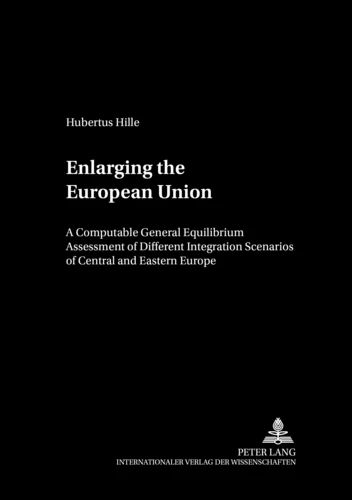Enlarging the European Union. A Computable General Equilibrium Assessment of Different Integration Scenarios of Central and Eastern Europe
Par :Formats :
- Paiement en ligne :
- Livraison à domicile ou en point Mondial Relay indisponible
- Retrait Click and Collect en magasin gratuit
- Nombre de pages210
- ISBN3-631-37329-5
- EAN9783631373293
- Date de parution01/04/2001
- CollectionSchriften zur Wirtschaftstheor
- ÉditeurPeter Lang
Résumé
European politics has provided clear signals : the next round in the process of EU enlargement with the accession of the Central and Eastern European countries (CEEC) will come. Since expectations concerning the costs and benefits of integration are varied, it is our aim to contribute to this discussion by undertaking an empirical assessment of integration. Firstly the extent of potential free labour mobility between the CEEC and the EU is assessed using an econometric model.
On that basis, different integration scenarios, i.e. trade liberalisation, capital transfers and labour migration are simulated using a computable general equilibrium model. Our results suggest that migration flows will be moderate and that integration is likely to cause positive welfare effects in the CEEC and negligible effects in the EU.
On that basis, different integration scenarios, i.e. trade liberalisation, capital transfers and labour migration are simulated using a computable general equilibrium model. Our results suggest that migration flows will be moderate and that integration is likely to cause positive welfare effects in the CEEC and negligible effects in the EU.
European politics has provided clear signals : the next round in the process of EU enlargement with the accession of the Central and Eastern European countries (CEEC) will come. Since expectations concerning the costs and benefits of integration are varied, it is our aim to contribute to this discussion by undertaking an empirical assessment of integration. Firstly the extent of potential free labour mobility between the CEEC and the EU is assessed using an econometric model.
On that basis, different integration scenarios, i.e. trade liberalisation, capital transfers and labour migration are simulated using a computable general equilibrium model. Our results suggest that migration flows will be moderate and that integration is likely to cause positive welfare effects in the CEEC and negligible effects in the EU.
On that basis, different integration scenarios, i.e. trade liberalisation, capital transfers and labour migration are simulated using a computable general equilibrium model. Our results suggest that migration flows will be moderate and that integration is likely to cause positive welfare effects in the CEEC and negligible effects in the EU.

